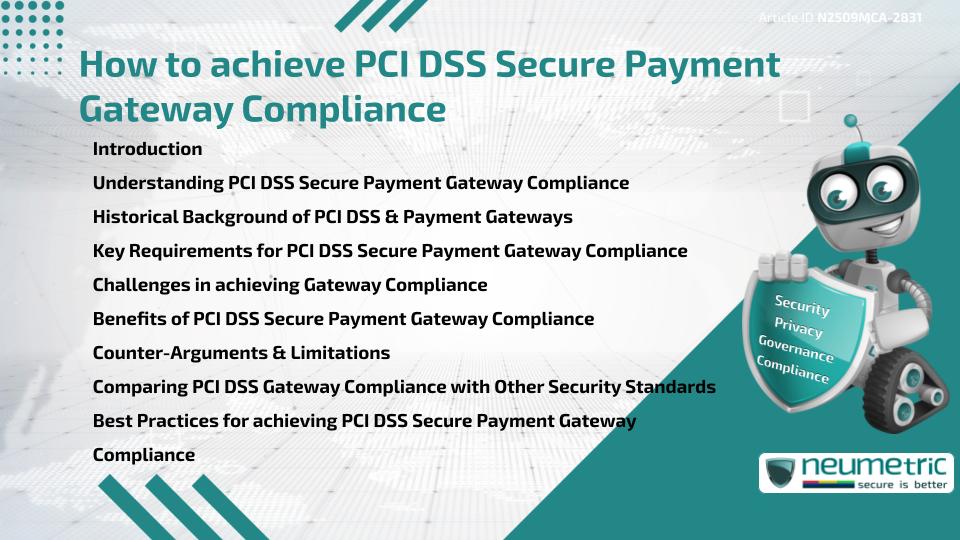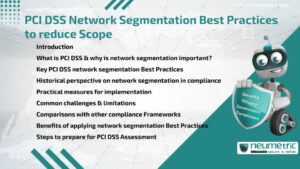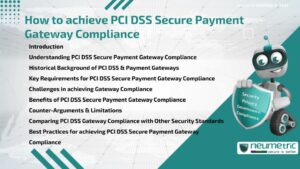Table of Contents
ToggleIntroduction
The PCI DSS Secure Payment Gateway Compliance Framework ensures that businesses handling online transactions protect Cardholder Data with robust Security Measures. A Secure Payment Gateway acts as the link between merchants, Customers & Banks, making Compliance critical to prevent fraud, breaches & reputational damage. By achieving PCI DSS Secure Payment Gateway Compliance, businesses can build Customer Trust, meet regulatory demands & ensure long-term operational success.
Understanding PCI DSS Secure Payment Gateway Compliance
PCI DSS or Payment Card Industry Data Security Standard, outlines a set of controls for securing payment card transactions. When applied to gateways, PCI DSS Secure Payment Gateway Compliance requires the encryption, monitoring & safeguarding of sensitive Cardholder Data as it moves between systems. Gateways must adhere to strict security Standards to protect against unauthorized access, data leaks & Cyber Threats.
Historical Background of PCI DSS & Payment Gateways
PCI DSS was introduced in 2004 by major card brands to unify & standardize payment Data Protection globally. As online commerce expanded rapidly, Secure Payment Gateways became central to card transactions. Over time, PCI DSS requirements evolved to address new Threats, from phishing to malware, making Compliance for payment gateways not just a regulatory obligation but a business necessity.
Key Requirements for PCI DSS Secure Payment Gateway Compliance
To achieve PCI DSS Secure Payment Gateway Compliance, businesses must meet several key requirements:
- Data Encryption: Encrypt Cardholder Data during transmission & storage.
- Access Controls: Restrict access to systems processing payment information.
- Authentication: Enforce multi-factor authentication for administrative access.
- Monitoring & logging: Track & log all access to sensitive systems.
- Vulnerability management: Regularly scan, test & patch systems to address Threats.
- Network segmentation: Isolate Cardholder Data environments from other systems.
- Incident Response: Establish procedures for detecting & responding to Security Incidents.
Challenges in achieving Gateway Compliance
Businesses face several challenges in achieving PCI DSS Secure Payment Gateway Compliance:
- Complexity of integrating legacy systems with modern gateways.
- High implementation & Audit costs.
- Maintaining Compliance across multiple payment channels.
- Managing Third Party service providers involved in payment processing.
- Keeping pace with evolving Cyber Threats & new PCI DSS versions.
Benefits of PCI DSS Secure Payment Gateway Compliance
Despite the challenges, the benefits of PCI DSS Secure Payment Gateway Compliance are significant:
- Protects Cardholder Data & reduces fraud Risks.
- Strengthens Customer Trust & brand reputation.
- Avoids fines & penalties for non-Compliance.
- Provides a competitive advantage in e-commerce markets.
- Enhances overall Cybersecurity posture beyond payments.
Counter-Arguments & Limitations
Some argue that PCI DSS Compliance can be resource-intensive, particularly for Small Businesses. Others suggest that Compliance may not guarantee complete protection against sophisticated attacks. While these points are valid, Compliance significantly reduces Risks & demonstrates due diligence, which is essential for building trust & ensuring resilience.
Comparing PCI DSS Gateway Compliance with Other Security Standards
Other Frameworks, such as ISO 27001 & NIST Cybersecurity Framework, address general Information Security. However, PCI DSS Secure Payment Gateway Compliance is unique because it focuses specifically on protecting Cardholder Data in payment transactions. Unlike broader Frameworks, PCI DSS is mandated by card networks, making it both industry-specific & non-optional for merchants & service providers.
Best Practices for achieving PCI DSS Secure Payment Gateway Compliance
Organisations can enhance their readiness & ensure Compliance by following Best Practices:
- Partner with PCI DSS-certified payment gateway providers.
- Conduct regular Vulnerability scans & Penetration Testing.
- Keep system patches & updates current.
- Train Employees on payment data handling Best Practices.
- Document Policies & procedures for Audit readiness.
- Implement Continuous Monitoring & Incident Response mechanisms.
Conclusion
The PCI DSS Secure Payment Gateway Compliance Framework is essential for protecting payment card data & ensuring secure transactions. By meeting Compliance Requirements & adopting Best Practices, businesses can reduce Risks, improve trust & achieve lasting success in digital commerce.
Takeaways
- PCI DSS Secure Payment Gateway Compliance protects Cardholder Data in online transactions.
- Key requirements include encryption, Access Control, monitoring & Incident Response.
- Challenges involve cost, integration & evolving Threats.
- Benefits include reduced fraud, stronger trust & a competitive advantage.
FAQ
What is PCI DSS Secure Payment Gateway Compliance?
It is the process of ensuring that payment gateways meet PCI DSS requirements for securing Cardholder Data.
Why is payment gateway Compliance important?
Because gateways handle sensitive card data, making them a prime target for fraud & breaches.
What are the main requirements for Compliance?
They include encryption, Access Control, monitoring, Vulnerability management & Incident Response.
What challenges do businesses face in Compliance?
Challenges include system complexity, costs & evolving Cyber Threats.
What benefits come from achieving Compliance?
Benefits include reduced Risks, enhanced trust, legal protection & competitive advantage.
How does PCI DSS differ from other Frameworks?
Unlike others, PCI DSS specifically governs Cardholder Data Protection in payment systems.
References
- PCI Security Standards Council – PCI DSS Overview
- NIST – Cybersecurity Framework
- ISACA – IT Audit and Assurance
- Council of Europe – Data Protection and Privacy
Need help for Security, Privacy, Governance & VAPT?
Neumetric provides organisations the necessary help to achieve their Cybersecurity, Compliance, Governance, Privacy, Certifications & Pentesting needs.
Organisations & Businesses, specifically those which provide SaaS & AI Solutions in the Fintech, BFSI & other regulated sectors, usually need a Cybersecurity Partner for meeting & maintaining the ongoing Security & Privacy needs & requirements of their Enterprise Clients & Privacy conscious Customers.
SOC 2, ISO 27001, ISO 42001, NIST, HIPAA, HECVAT, EU GDPR are some of the Frameworks that are served by Fusion – a SaaS, multimodular, multitenant, centralised, automated, Cybersecurity & Compliance Management system.
Neumetric also provides Expert Services for technical security which covers VAPT for Web Applications, APIs, iOS & Android Mobile Apps, Security Testing for AWS & other Cloud Environments & Cloud Infrastructure & other similar scopes.
Reach out to us by Email or filling out the Contact Form…





